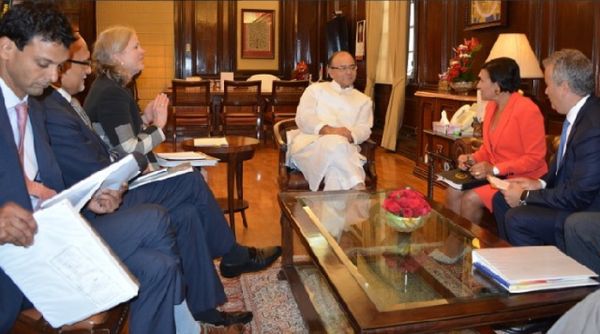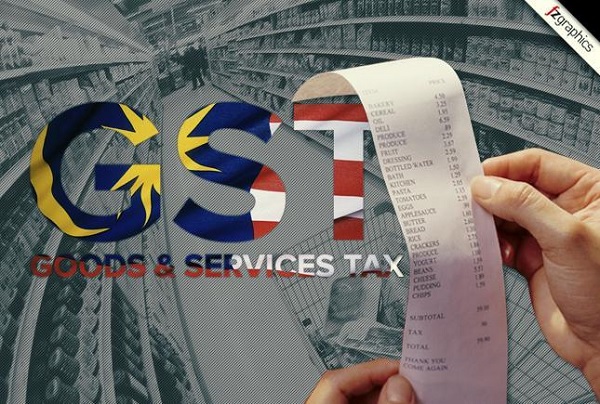
by admin | May 25, 2021 | Economy, News, Politics
 New Delhi : Calling the Goods and Services Tax a “tsunami of tax terrorism”, Congress Vice President Rahul Gandhi on Thursday compared demonetisation and GST with a double tap bullet fired at the economy to ensure it was dead.
New Delhi : Calling the Goods and Services Tax a “tsunami of tax terrorism”, Congress Vice President Rahul Gandhi on Thursday compared demonetisation and GST with a double tap bullet fired at the economy to ensure it was dead.
In a hard-hitting attack, Gandhi also called Prime Minister Narendra Modi “a person with a small heart” and said the economy was staring at disaster, a “Modi-made disaster”.
“GST, as this government has formulated it, has already unleashed a tsunami of tax terrorism and it is only going to get worse.
“Modiji and his government have fired a double tap at the heart of the economy. First notebandi… bang…, and then GST…, bang… have crippled our economy. The situation of joblessness in the country is extremely worrying. The government is creating a massive army of unemployed, which is toxic and dangerous,” Gandhi said in his speech at the 112th annual session of the PHD Chamber of Commerce followed by a question-answer session.
The Congress leader said instead of admitting they are not able to provide jobs and are pitting communities against each other in a bloody rage.
“The way the regime is working, or not working, has led to a double tap killing of the Indian economy. Commandos, in hostage situation, fire what is called a double tap. Two quick closely-placed shots are fired at the chest to ensure that their terrorist target is down,” he added.
“In a couple of weeks, we will observe the ‘death’ anniversary of the Rs 500 and Rs 1,000 currency notes. November 8 is the ‘barsi’ (death anniversary) of ‘notebandi’ — the day Modi personally wiped out overnight 86 per cent of the currency in circulation,” Gandhi said.
“It was a move taken without thought, without consultation, or concern, for its conseqences. The Prime Minister failed to grasp the basic concept of the Indian economy,” he said.
“All cash is not black, and all black is not cash. Without understanding this basic concept, the Prime Minister used his vast powers to unleash terror on the citizens of India, to make them stand in queues for two months. Many died in the process, millions lost jobs, and their livelihood,” the Congress leader added.
“To do all this, you surely need someone with a very big chest, but a very small heart. Demonetisation crippled micro, small and medium enterprises, and destroyed the unorganised sector, forcing workers to leave urban employment and go back to their villages in search of MGNREGA (Mahatma Gandhi National Rural Employment Guarantee Act) work,” Gandhi said.
The Congress leader claimed investments in India were at a 15-year low.
“The growth, which was 6.6 per cent in 2014, is today 4.2 per cent by the yardstick the government is using today. Bank lending is at its lowest in 60 years. Unemployment is skyrocketing.
“Recent research showed that inequality in India is now the highest in 100 years. We are staring at a disaster. This is a man-made disaster — or in Modiji’s terminology, an MMD or Modi-Made Disaster.”
Gandhi said public trust in the government was dead.
“For some reason, the Prime Minister and the government are absolutely convinced that every single person is a thief. The government does not believe its own people,” he said.
The Congress leader said one develops trust by listening and the government does not listen. “Business thrives on trust as it creates a reliable environment,” he said.
Recalling Modi’s first speech in Parliament, Gandhi said it was marked by a lot of taglines and did not have a concrete way forward.
“What disturbed me was the condescending tone that ran through his entire speech and that tone has embedded itself in his government’s psyche and has become the bedrock of its immense arrogance,” he said.
—IANS

by admin | May 25, 2021 | Business, Corporate, Corporate Governance, Large Enterprise, News, Politics
 New Delhi : Finance Minister Arun Jaitley on Tuesday said that the number of trade registrations under GST has seen an increase of 30-35 per cent in the first three months, and that the total assessee base has already crossed one crore, which is an “encouraging” indicator.
New Delhi : Finance Minister Arun Jaitley on Tuesday said that the number of trade registrations under GST has seen an increase of 30-35 per cent in the first three months, and that the total assessee base has already crossed one crore, which is an “encouraging” indicator.
“Till now the trade registrations for Goods and Services Tax (GST) is very encouraging; 72 lakh traders have moved from the old system (previous indirect tax regime); 28 lakh people are new registrants. Total assesses have reached above one core,” Jaitley told reporters here at a press briefing.
“In the first three months, there has been a 30-35 per cent increase in registrations, which is a good indicator,” he said.
The Finance Minister added that currently the transition phase was on as the goods still being sold were manufactured during the earlier indirect tax regime.
“In initial months, the goods sold were manufactured in the old system. The transition phase is going on. The goods with new packaging will come into the system. We have reached about Rs 93,000-94,000 crore worth of monthly trading collections including IGST,” he said.
According to the September collection figures under GST, Rs 92,150 crore was collected from 42.91 lakh businesses up to October 23.
Over Rs 95,000 crore was collected through GST during July, the first month of its implementation, while the figure for August was over Rs 91,000 crore.
For August, only 55 per cent of businesses had filed returns till September 25.
Every month the businesses filing returns is seeing an increase, he added.
—IANS

by admin | May 25, 2021 | News, Politics
 New Delhi : In a relief to GST taxpayers, the government on Tuesday waived the penalty for filing late returns for the months of August and September, and the money already paid as penalty will be credited back to businesses.
New Delhi : In a relief to GST taxpayers, the government on Tuesday waived the penalty for filing late returns for the months of August and September, and the money already paid as penalty will be credited back to businesses.
“To facilitate taxpayers, late fee on filing of GSTR-3B for August and September has been waived. Late fee paid will be credited back to taxpayer ledger,” Finance Minister Arun Jaitley announced in a tweet.
Late fee of Rs 200 per day was being charged from businesses.
For the month of August, only 55 per cent of businesses had filed returns till September 25. September 20 was the last date to file GSTR-3B.
For the month of September, the last date to file GSTR-3B was October 20.
GSTR-3B is a summary return of details of outward supplies, inward supplies, credit and payment of Goods and Services Tax (GST).
The government had earlier waived off penalty for late returns for the month of July.
GST expert Pritam Mahure told IANS, “It’s a beneficial move and will benefit taxpayers who are yet to file or have filed delayed returns. However, the late fee is getting credited in ledger and thus cannot be set off against tax liability as of now.”
—IANS

by admin | May 25, 2021 | Economy, Investing, Markets, News, Politics
 New Delhi : Post-demonetisation and implementation of the Goods and Services Tax (GST), the current economic slowdown has “bottomed out” and the recovery of the economy would “critically depend on the initiatives” the government takes from now onwards, according to a report released on Monday.
New Delhi : Post-demonetisation and implementation of the Goods and Services Tax (GST), the current economic slowdown has “bottomed out” and the recovery of the economy would “critically depend on the initiatives” the government takes from now onwards, according to a report released on Monday.
The report also said the quantum of impact of the structural reforms – demonetisation and GST – was expected but the quantum was not estimated and hence the current slowdown in the economy is painful.
“We believe that the slowdown has bottomed out, however, the stage and pace of recovery would critically depend on the initiatives that the government takes from now onwards to boost the growth momentum, especially the private sector investment, without which we will not be able to aim for an ambitious growth rate,” said Arun Singh, Lead Economist Dun & Bradstreet (D&B) India.
According to D&B Economy Observer, the rebound in industrial production, especially in capital goods is not just driven by festive-led demand and is on a sustainable basis.
“…as both the formal and informal segment of both the industrial and the services sector adjust themselves to the overall GST system and the frequent changes suggested under GST Councils, GVA (Gross value added) will grow only by 6.2 per cent in Q2 (second quarter) FY18, slightly higher than 5.6 per cent in Q1 (first quarter) FY18,” the report said.
It also said the recovery in exports, moderate interest rate, lower inflation rate, controlled trade deficit, sizable FDI inflows and the government’s commitment towards fiscal discipline are likely to pave the way for the economy to recover from the current scenario on a strong note.
“It is also expected that the continued reforms aimed at the formalisation and increase in accountability in the economy will help in preventing leakages and flow of resources in the desired direction and provide a strong foundation for a robust and sustainable growth process,” Singh said.
According to the report, Index of Industrial Production (IIP) is expected to grow by 4.-4.2 per cent during September 2017.
The CPI inflation would be in the range of 3.3-3.5 per cent and WPI inflation to be in the range of 2.7 – 2.9 per cent during October 2017, respectively.
—IANS

by admin | May 25, 2021 | Opinions
 By Vinod Behl,
By Vinod Behl,
Much against the expectations of the real estate sector, this year’s festive season is turning out to be somewhat disappointing for property developers as aspiring home buyers are extra cautious about investments in the backdrop of the slowing economy and unstable realty sector, hit by the short-term impact of the Real Estate Regulation Act (RERA) and the Goods & Services Tax (GST).
Capital-starved property developers, sitting on huge unsold inventories of residential real estate, had been banking heavily on this year’s festive season to push sales and cut down their inventories. Their optimism stemmed from the fact that property rates have bottomed out and the home loan interest rate has touched a six-year year low of 8.35 per cent and that the enactment of RERA, which empowers and protects consumers, would boost the sentiments of home buyers.
Buoyed by all this, developers had lined up the best of bargains, with attractive deals and discounts that include free modular kitchens, free club membership, free car parking, no GST and no maintenance charges, no EMI till possession and waiver of stamp duty & registration fee. So much so that developers were quoting all-inclusive pricing and giving their track record of delivery to win the confidence of buyers.
But, unlike in the past, when prospective property buyers eagerly waited for the festive sales, this year, the charm of the season has somewhat diminished as months before its onset, developers and real estate marketing companies had been holding property festivals/shows and offering handsome bargains to liquidate their unsold inventories. This, according to the latest industry statistics,stands close to four years, with the NCR topping with an inventory of 58 months.
Also, unlike the past trend, this festive season did not have new offerings to attract home buyers as developers were focusing on completing and delivering ongoing projects rather than launching new ones. Moreover, in the backdrop of large-scale delivery defaults, home buyers are very much concerned about the safety of their investment. This is clearly reflected in the distinct trend of buyers increasingly opting for ready-to-move homes to avoid development risks. That, however, is not contributing to big sale numbers as the ready-to-move inventory is limited.
The unfavourable employment scenario is also playing spoilsport. With disposable income going down, the cautious and more discernible buyers are looking at fundamentals of property to assess the safety and viability of their investment. Home buyers are now not simply swayed by freebies as home buying has now become need/choice based and buyers are more sensible to judge if the offers are both beneficial and fit into the their scheme of things.
Today’s property buyer is also aware about taking an informed decision to buy a home after clearly judging the pros and cons of buying and renting. In a slowing economy, renting makes better sense from the point of view of cost benefits. Despite the fact that property prices have stagnated/declined and home loan rates are much lower, buying is still a costlier option as the EMI is much higher than the monthly rent and, in case of construction delays, one is burdened by both rent and EMI. Also, in the current market scenario, it is not a profitable proposition for investors to buy residential property as its appreciation is too low and even rental yield is hardly half of the global yield of 5-8 percent. Moreover, the Noida controversy over the non-delivery of flats to about 100,000 home buyers, even years after the promised delivery date, has badly shaken the confidence of prospective home buyers, making them much more prudent about investing in property.
Clearly, in this backdrop of lack of transparency and fairplay in real estate transactions, the trend of household savings shifting from physical (real estate and gold) to financial assets (equity, MF) has been catching up. This trend has been more visible after demonetisation and the digitalisation of economy. This is reflected in the recent spurt in investments in the stock market and mutual funds. Equity MF inflows tripled to Rs 80,000 crore in April-September FY18, with the asset base jumping 25 per cent from Rs 5.43 lakh crore in March 2017 to Rs 6.59 lakh crore in September 2017.
Low interest rates are having a positive impact on equity investments, especially in view of low investments in fixed deposits. The equity markets have attracted a record Rs 2.15 lakh crore of cumulative investments over the past three years (FYs 15-17) and the trend continues as real estate stocks have been performing well with BSE Realty Index gaining 40.2 percent over past one year. Morgan Stanley data shows that in terms of post tax returns (CAGR) of different asset classes over the medium (five years) and long (10 years) terms, equity scores over other asset classes.It posts returns of 11 per cent and 17 per cent respectively, compared to property (8 per cent & 13.4 per cent), Gold (9 per cent & 12.9 per cent) and FDs (5.7 & 5.2 per cent).
Notwithstanding this dull scenario, there is one noticeable change this time. Unlike last year, end-users are out in large numbers to explore the market for the ready-to-move affordable and mid segments. And in the coming months, as RERA & GST settle in, affordable housing, with greater policy support from the government, will lead the recovery of residential real estate.
(Vinod Behl is editor, Realty Plus, a leading real estate monthly. The views expressed are personal. He can be reached at vbehl2008@gmail.com)
—IANS

 New Delhi : Calling the Goods and Services Tax a “tsunami of tax terrorism”, Congress Vice President Rahul Gandhi on Thursday compared demonetisation and GST with a double tap bullet fired at the economy to ensure it was dead.
New Delhi : Calling the Goods and Services Tax a “tsunami of tax terrorism”, Congress Vice President Rahul Gandhi on Thursday compared demonetisation and GST with a double tap bullet fired at the economy to ensure it was dead.



